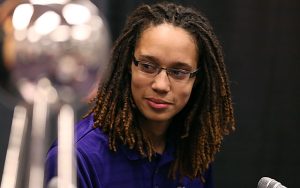Last week WNBA star, Olympic gold medalist and Baylor Bear standout Brittney Griner was moved to one of Russia’s most notorious prison camps to begin serving her nine-year sentence for possession of drugs. A remarkable all-round player, she led Baylor to a national championship and a 40-0 undefeated season.
I never taught Brittney, but I have fond memories of her riding her skateboard past Carroll Science, dreadlocks flying, a sweet goofy grin on her face. Atop her board she was literally a foot taller than everyone she passed.

Greg Garrett
She didn’t look like anyone else, and she didn’t play like anyone else.
I’ve followed her career with pride and remembered her with thanks, both for her gifts to Baylor and for the courage it took to be who she is. When she came out to her parents in high school, her mother accepted and supported her, but her father did not, and Brittney had to live with a coach during part of her senior year.
And it can’t have been easy to be a gay player coming to play for Kim Mulkey at Baylor in 2009. She navigated that difficult situation with some grace, mostly obeying Mulkey’s orders to be discreet about her love life, and not coming out publicly until she was selected in the WNBA draft in 2013. (Brittney says anyone paying attention was not surprised; I wasn’t.)
But earlier this year when she went to Russia to play on a club team, Brittney was arrested for allegedly trying to smuggle less than a gram of hashish oil into the country, put on trial, and convicted. Regardless of the truth or falsehood of these accusations, the United States government considers hers a wrongful imprisonment and believes Griner is being held as a political pawn, or as revenge for America’s staunch support of Ukraine.
“Who could be a more tangible object of everything Vladimir Putin hates than a Black lesbian American athlete?”
And it makes sense: Who could be a more tangible object of everything Vladimir Putin hates than a Black lesbian American athlete?
While there is real hope for a prisoner exchange, Griner has been in custody for nine months, already has suffered who knows what indignities, abuses and violence, and will be exposed to more in prison. But while I have seen social media posts from people who love Baylor and are distressed about Brittney’s situation, as Mark Wingfield has noted, the silence from Baylor at large about one of her most famous students is saddening.
 In my 30-plus years of teaching, I have heard and used the phrase “Baylor family,” and I believe it means something: that Baylor, like the church, is a place that loves and accepts and challenges and encourages all those who are part of the family, whether students, staff, regents or alumni.
In my 30-plus years of teaching, I have heard and used the phrase “Baylor family,” and I believe it means something: that Baylor, like the church, is a place that loves and accepts and challenges and encourages all those who are part of the family, whether students, staff, regents or alumni.
That we care about each other and look after each other.
That, God forbid, if any of us should fall among thieves, the Baylor family will go to that person and take her to safety and do whatever is needed to nurse her back to health.
“Baylor folks should have been leading the charge to raise awareness about Brittney’s wrongful imprisonment.”
Baylor folks should have been leading the charge to raise awareness about Brittney’s wrongful imprisonment, and we should be moving heaven and earth now to rescue her from bondage. But except for current Baylor head coach Nicki Collen (who said, “She’s a daughter and a wife and a mother and a sister…. She’s a family member and she’s a part of the Baylor family”), that simply hasn’t happened, and I fear I know why.
I am well aware that Baylor faces tremendous pressure from all sides as Baptists seek to navigate LGBTQ issues and the status of gay and trans Christians. Every Christian denomination that has taken on this necessary work has wound up fractured and wounded, regardless of what they ultimately decide, and undoubtedly the same will be true with us. Some people want to stop giving to Baylor until it offers a more concrete policy of welcome and affirmation to LGBTQ students; some people want to stop giving to Baylor because of the steps it already has taken.
I have been public about where my own reflection, interpretation of Scripture and denominational affiliation have led me: God doesn’t make mistakes; every human is made in God’s very image. God loves everyone; we are called to love as God loves. My gay brother or trans sister is family; all of us should gather at the Welcome Table.

Baylor center Brittney Griner celebrates after she scored 50 points during the second half of an NCAA college basketball game against Kansas State, in Waco, Texas. Griner was selected as The Associated Press’ women’s college basketball player of the year on Saturday, April 6, 2013. (AP Photo/LM Otero, File)
I also am well aware that not every Christian has reached my conclusions; I am related to a few who see things differently. But regardless of our own positions or Baylor’s current policies, if we needed biblical support for how the Baylor family — for how all people of faith — should be reacting to Brittney’s plight, we need look no further than Matthew 25, the culminating moral lesson in a Gospel full of moral lessons. There, Jesus concludes that our professions of faith matter less than our faithful actions. If we feed the hungry, if we tend the sick, if we care for the poor, if we visit the prisoner, it is as if we have performed those actions for Jesus himself. Jesus calls those who do so “righteous,” and there is no greater praise in all the Scriptures.
Still, some good Christian people have concluded that Griner has simply gotten what she deserves. (I wonder if those opinions would cling to a straight white male athlete). Others simply find it easier to look away: Brittney is that family member we don’t talk about.
I have watched Encanto a dozen times on airplanes. In that brilliant soundtrack by Lin Manuel-Miranda, the one song that went viral was “We Don’t Talk about Bruno.” It’s a catchy tune, but a sobering story: Bruno is the family member who looks and acts a little different. His gifts are prodigious, but they force his family to consider the future, and often that disturbs them. He’s the one who ends up cast aside, separated from everyone he loves.
The way Bruno is treated and the things said about him represent a startling failure of empathy and compassion from a loving family. And I fear our unwillingness to deeply engage with Brittney Griner’s trials, whatever the reasons, represents a failure for us as well.
We don’t talk about Brittney.
But we should.
Greg Garrett teaches creative writing, film, literature and theology classes at Baylor University. He is the author of two dozen books of fiction, nonfiction, memoir and translation, including the critically acclaimed novels Free Bird, Cycling, Shame and The Prodigal. He is one of America’s leading voices on religion and culture. One of his most recent nonfiction books is In Conversation: Rowan Williams and Greg Garrett. His latest book, A Long, Long Way: Hollywood’s Unfinished Journey from Racism to Reconciliation, is hot off the presses. He is a seminary-trained lay preacher in the Episcopal Church. He lives in Austin with his wife, Jeanie, and their two daughters.
Related articles:
Dear Baylor, how long will you ignore Brittney Griner’s plight? | Opinion by Mark Wingfield
Baylor silent as Griner heads to Russian penal colony
Why aren’t we defending Brittney Griner? | Opinion by Rodney Kennedy


